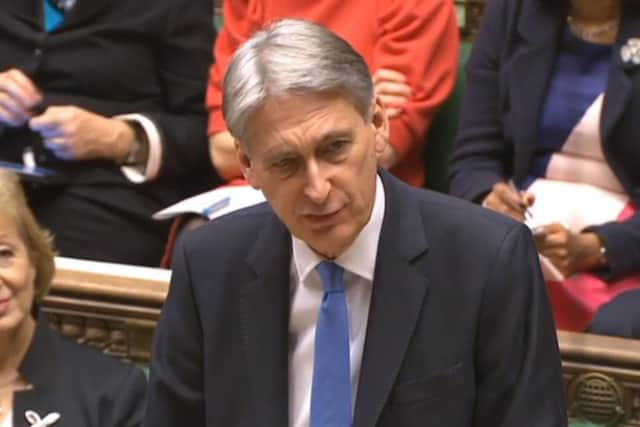What does the Budget mean for Scotland?
For Scotland, there were a number of headline points as the Government delivered their first major financial statement since the snap general election in June.
That vote may have cost the Conservatives their majority, and some would argue, Theresa May’s credibility, but the new reality also means there is a larger Scottish Tory presence.
Advertisement
Hide AdAdvertisement
Hide AdWe look at some of the devil in the detail of the Scottish announcements, and what impact, if any, the Budget will have on the wider political picture.


The main headlines
Arguably the main news was that Scotland is to receive an ‘extra’ £2bn in funding, spread over the next four years.
The Chancellor, to cheers from the now sizeable Scottish Tory contingent, announced the move, but in the immediate aftermath, Nicola Sturgeon has seized on the finer detail to accuse him of a ‘smoke and mirrors’ approach to funding.


According to the SNP, the £2bn won’t prevent the Scottish Government being on the receiving end of a real terms reduction in funding through the bloc grant.
Moves to alleviate pressure on the still-struggling North Sea oil industry were universally welcomed, but heavily trailed and thus hardly surprising.
So too, was the announcement that Scotland’s fire and police services would, from next year, be exempt from VAT payments – but there could yet be a row over that decision.
Credit where it’s maybe due
The VAT decision was as predictable as the reaction to it, the SNP saying it isn’t enough, and the Conservatives claiming credit for forcing the Chancellor’s hand.
Philip Hammond noted from the despatch box that he was now getting his ‘ear bent’ by the 13 Conservatives from north of the border.
Advertisement
Hide AdAdvertisement
Hide AdRuth Davidson and her colleagues were quick to paint this as a sign that their more collegiate style of requesting giveaways from the Chancellor is more effective than an SNP approach they would categorise as petulant.
Ross Thomson, one of the new breed of MPs, said the budget showed that the Scottish Conservatives were ‘delivering for Scotland’.
The SNP, for their part, highlight dozens of instances of requesting that the VAT be waived, and are already accusing the delighted Tories of claiming unfair credit for the move.
There are risks for both parties in this row – the SNP won’t wish to seem churlish about an outcome they ultimately desired, and the Conservatives can only gloat for so long until it appears unseemly.
A banana skin?
Perhaps one of the most significant decisions in the budget, in terms of Scottish political debate, is one that doesn’t actually apply to the country.
Mr Hammond announced, to some surprise, that Stamp Duty would be waived for first time buyers purchasing a house costing £300,000 or under.
This will save aspiring homeowners several thousand pounds, although the independent Office for Budget Responsibility (OBR) warned it could lead to a rise in house prices.
A broadly similar tax in Scotland, Land and Buildings Transactions Tax (LBTT), has come under scrutiny since the Holyrood Elections of last year.
Advertisement
Hide AdAdvertisement
Hide AdRuth Davidson raised the issue of LBTT at First Minister’s Questions, after a report indicated a slowdown in certain sales as a result of its introduction.
The Scottish Conservatives are already calling for Finance Secretary Derek Mackay to follow the Chancellor’s lead and aid first-time buyers in Scotland.
It has already been pointed out that the move could make a house in Scotland around £3,000 more expensive for first-time buyers than an equivalent property in England.
With a minority government reliant on opposition support to pass a budget, the SNP could find themselves under significant pressure to cut LBTT for first-time buyers.
One set-piece political event has concluded today, but the consequences will be felt in Scotland all the way to the Scottish budget on December 14, and far beyond.